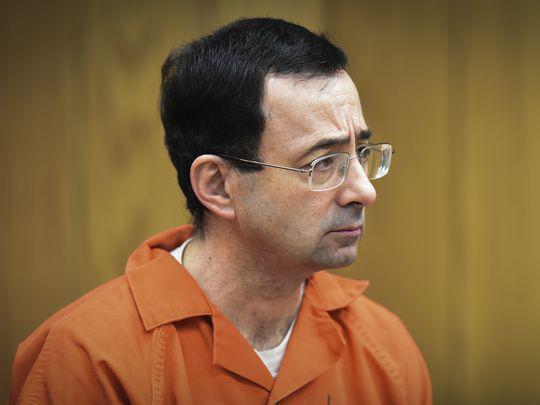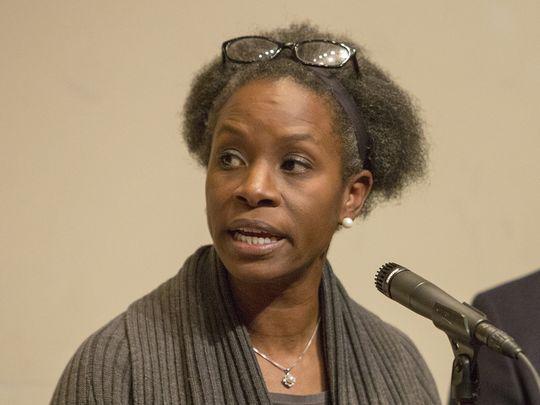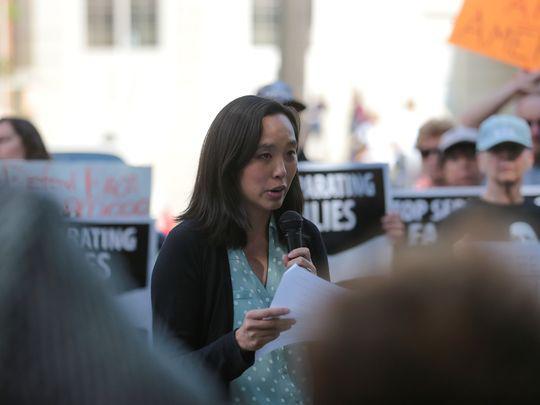|
Larry Nassar case, #MeToo spur new Michigan legislation to combat sexual assault
By Kristen Jordan Shamus
[with video] A group of Michigan lawmakers came together Monday to call for a three-pronged approach to combating sexual assault and harassment, especially on college campuses, aiming to pass new laws that will bolster prevention and education, better protect assault survivors and offer more accountability. The Michigan Progressive Women's Caucus hopes to lift the statute of limitations on sexual assault cases involving those under the age of 16, create a new position of Title IX ombudsman within the state Department of Civil Rights, and increase funding for sexual assault prevention and education programs, among other measures. The action comes in the midst of the #MeToo movement, and after the sentencing hearings of former Michigan State University sports medicine doctor Larry Nassar, who will serve the rest of his life in prison after assaulting hundreds of women and girls in the guise of medical care. "For nearly two decades, Nassar was able to thrive in a campus culture that allowed him to continue abusing the power of his position to abuse young women and girls," said state Rep. Stephanie Chang, D-Detroit, who is also chairwoman of the Michigan Progressive Women's Caucus. "Athletic trainers, assistant coaches, a university police detective and even the president of the university were made aware of Title IX complaints that were made, yet they did not take the appropriate actions to stop Nassar from assaulting women and girls on campus. … For too long, Michigan has failed to lead the crusade against sexual assault on campus. So these principles build on ongoing bipartisan conversations going on at the Capitol about this critical issue." State Rep. Kristy Pagan, D-Canton, co-chairwoman of the caucus's Gender Violence Task Force, said the state needs better funding of sexual assault prevention education and also should require health care facilities to post notices advising minors of their rights during sensitive examinations, so they're aware that they can request that a parent, guardian or other trusted adult be present. "It’s critical during the aftermath of the Larry Nassar scandal we work to better provide support for survivors and learn from how we have failed them in the past," said Pagan. The state doesn't allocate any money for rape prevention and services in its Department of Health and Human Services budget, Pagan said. She'd like to see an allocation of at least $1 million from the state budget for that, which would roughly double federal funding in Michigan for those services. "We are one of the only states in the country that does not have any money going toward sexual assault prevention," Pagan said. "This leaves a striking gap in providing these services to nonprofits. We are only able to fund 18 nonprofits that focus on sexual assaults throughout our entire state. And these 18 nonprofits are only able to cover 33 of Michigan's 83 counties." Another gap is in protections for survivors of campus sexual assault and harassment, said state Rep. Erika Geiss, a Democrat from Taylor and vice chairwoman of the caucus. She said the state needs to create the position of Title IX ombudsman within the Department of Civil Rights "who will be dedicated to listening to, and believing victims." The ombudsman would be a resource for college students who report sexual assault, harassment or violence, and would work to protect those students from intimidation and retaliation. "Creating a Title IX ombudsman would help to strengthen the laws on Title IX reporting and ensure that victims and survivors are given the support and help that they need," said Geiss, noting that U.S. Education Secretary Betsy DeVos has softened the department's approach to Title IX protections for victims. "Creating this Title IX ombudsman would reaffirm Michigan’s commitment to protecting those who are victims of unwanted sexual behaviors," Geiss said. She also said part of the caucus's policy plans involve legislation that would ban schools from expelling or suspending students who report sexual assault. "Because our society has systematically failed to listen to and believe victims without also assigning shame, blame or invalidation, taking the step of reporting can already be intimidating and difficult. This is why it is unacceptable for us to allow anyone to silence or tamper with the victims when she or he speaks out," Geiss said. In addition, the group would work to boost funding for domestic violence and sexual violence treatment programs and expand eligibility for state-covered medical care for survivors of sexual assault. "I cannot stress enough that key in protection is ensuring that victims and survivors are listened to, clearly and without judgment and without dismissing the validity of their experience not only every single time a report is made, but most important, the first time," Geiss said. State Rep. Donna Lasinski, D-Scio Township, said another key element to the plan is working to eliminate the 10-year statute of limitations for charging or filing a civil lawsuit against a person suspected of committing a sexual assault on a person under the age of 16. "We know that for adults, the processing of a sexual assault is very difficult," she said. "For those who are minors when the assault occurred, we know that these are some of our most vulnerable citizens. It is disgusting and inhumane to take away a child’s innocence and to rush them through process of what it takes for them to reconcile what has happened them." "It is critical we break down the barriers that stand between a victim of assault and justice. Right now, one of those barriers is a time limit for them to file a complaint or to raise the issue of the sexual assault," she said. "We need to allow them to cope with their experiences at their own pace." In addition, Lasinski suggested that health facilities should be required by law to begin investigating any complaint of sexual assault by a health professional within 48 hours. "What we know is when these complaints are raised, we can’t let the victims sit with that, and feel that no action is being taken," Lasinski said. "By requiring a health professional to take action within 48 hours, and if they fail to do so, imposing certain penalties on the health facility for failing to ensure the safety and protection of their patients. "We know that when the victims of Larry Nassar spoke out to university officials, to their parents, to Nassar’s colleagues, they were ignored and disbelieved. "We stand with the survivors. … We will not allow their voices to be continue to be silenced." Chang said several bills have already been introduced in the Legislature and await hearings; others are being drafted. "We have a package of bills that we are working with our colleagues in the House and Senate to make sure that it's bipartisan and bicameral and that these bills actually do get passed," she said, though she couldn't say exactly when. "It's about getting things right, not doing them as quickly as possible," Chang said. "It’s really going to be a continuing conversation with all of our colleagues in both chambers to ensure we get the best bill package possible. "What we're seeing with proposals coming out from legislators on all sides of the aisle and in both chambers, is that actually there is a lot of attention on this issue ad we’re optimistic that here won't be a hold up and it’ll actually be something that we can see these proposals move forward in the coming weeks and months." Contact: kshamus@freepress.com
|
.
Any original material on these pages is copyright © BishopAccountability.org 2004. Reproduce freely with attribution.




